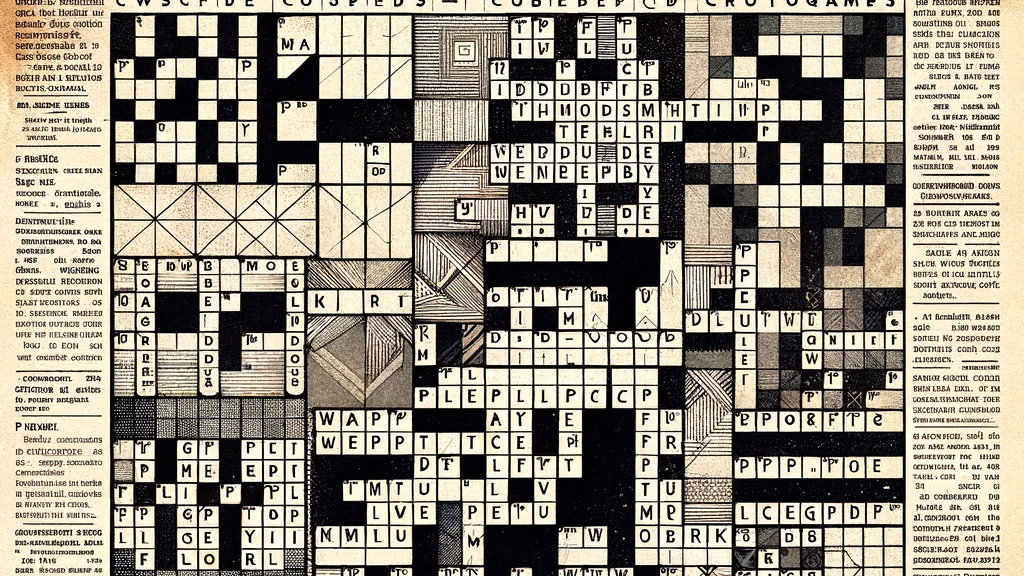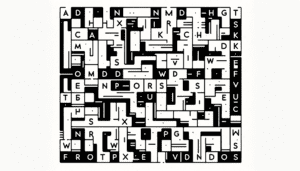
Word Games
It’s funny – not ha-ha funny – how technology changes things. When I grew up they were just board games. We’d gather around the table after a meal or when relatives came by and just had play until someone got tired. We’d argue about the rules while plotting our next move. It was simple, uncomplicated fun.
As with most things, these times changed. Now they’re sometimes called “offline” games. Regardless of what they’re called, it’s still a worthy pastime, alone or with others across the table.
In an age dominated by digital entertainment, offline word games remain a simple joy. These ’old’ games, free from the constraints and distractions of technology, offer a unique blend of mental stimulation, creativity, and a touch of nostalgia. They have a timeless appeal and have captivated our minds for generations.
Offline word games, ranging from the classic Scrabble to the challenging cryptograms found in the corners of newspaper comics pages, have long been a source of entertainment, education, and social interaction.
They invite players to step away from the screen, gather around a table, or cozy up with a pencil and paper, engaging the mind in ways that digital games often cannot replicate. These games are not just about spelling or vocabulary; they are about strategy, lateral thinking, and sometimes a healthy dose of competition.
In this article, we will explore various facets of offline word games. From their origins nestled in the comics pages of newspapers to modern variations that still intrigue and challenge players.
We will look at how they have evolved, their benefits in educational and cognitive development, and some tips to enhance your word game skills. Whether you are a seasoned wordsmith or a curious beginner, there’s something in the world of offline word games for everyone.
The Comics Page: A Nostalgic Source of Word Games

Rediscovering the Charm of Newspaper Puzzles
Long before the digital era’s convenience, the comics page of newspapers was a treasure trove for puzzle enthusiasts. Nestled among the colorful comic strips, cryptograms, and other word games offered a delightful challenge to readers. These puzzles weren’t just a solitary pastime; they were a communal experience, often discussed over breakfast tables and office water coolers.
Cryptograms: A Brain-Boosting Puzzle
YOU C— — 'T
H— — — L— TH— T— UTH!
Cryptograms, are a staple of the comics page. These encrypted messages, where each letter is substituted with another, require not just a good vocabulary but also a sharp mind for pattern recognition and problem-solving. Solving a cryptogram is like unraveling a mystery, making them an excellent exercise for cognitive skills.
We have an excellent set of books that are cryptogram-themed. Take a look here.
The Appeal of Newspaper Word Games
What made these newspaper puzzles so appealing was their accessibility and simplicity. They required no special equipment or digital devices – just a paper, a pencil, and a keen mind. This simplicity also made them inclusive, enjoyed by people of various ages and backgrounds.
A Bridge Between Generations
For many, these puzzles are a link to the past, reminding them of days spent with grandparents or parents, deciphering words and phrases. They represent a tradition of offline gaming, where the joy comes not from flashy graphics or fast-paced action, but from the quiet satisfaction of solving a challenging puzzle.
Continuing the Legacy
Today, while newspapers have diminished in popularity, the legacy of these word games lives on. They continue to be a source of entertainment and education, offering a momentary escape from the digital world and a chance to sharpen our minds in a fun, engaging way.
Classic Offline Word Games and Their Enduring Appeal
Scrabble: The Quintessential Word Game
Scrabble, a game where players score points by creating words on a game board, is perhaps the most iconic offline word game. Its appeal lies in its perfect blend of linguistic skill and strategic thinking. Scrabble challenges players to think creatively, using their vocabulary to maximize point scores with each turn.
Crossword Puzzles: A Daily Brain Exercise
Another classic is the crossword puzzle, a staple in many daily newspapers. These puzzles test players’ knowledge across various domains, from history and science to pop culture. Solving crosswords is not just about knowing a lot of words; it’s about making connections and understanding context.
Boggle: A Race Against Time
Boggle, with its simple premise of finding words in a grid of letters, is a thrilling race against time. Players must quickly identify as many words as possible within a set time limit. Boggle is excellent for all ages, offering a fun way to improve word recognition and spelling skills.
The Timeless Appeal of These Games
What makes these games enduring is their simplicity and the intellectual challenge they offer. They don’t require fancy equipment or the latest technology – just a set of tiles, a pencil and paper, or a box of lettered dice. This simplicity makes them timeless, appealing to each new generation.
A Social Experience
Additionally, these games often become a social experience, bringing people together in friendly competition. Whether it’s a family game night with Scrabble, a group challenge to see who can find the most words in Boggle, or a couple enjoying their morning coffee with a crossword puzzle, these games create moments of connection.
Creative Word Games for Groups and Solo Play
Innovative Offline Games for Word Enthusiasts
While classic word games like Scrabble and Crossword puzzles have their charm, there’s a world of creative offline word games that offer unique challenges and fun. These games break the mold, providing fresh and innovative ways to play with words, whether alone or in groups.
Solo Word Adventures
For those who prefer solitary play, games like word searches and jigsaw-style word puzzles are perfect. These games can be immensely satisfying, as they combine the joy of word discovery with the tranquility of spending time alone. They’re not just entertaining; they’re also a great way to unwind and de-stress.
Group Word Games: Fun and Laughter Guaranteed
Group word games, on the other hand, can turn any gathering into a lively and memorable event. Games like charades or Pictionary, though not word games in the traditional sense, revolve around words and offer a hilarious and interactive way to engage with language. These games are great for parties or family get-togethers, fostering laughter and teamwork.
Word Games for All Ages
The beauty of these games is their universal appeal. They can be tailored to suit any age group, making them perfect for family game nights where everyone from kids to grandparents can join in. They’re not just games; they’re tools for bonding and learning.
The Educational Angle
Beyond the fun, these creative word games have educational benefits too. They encourage players to expand their vocabulary, improve spelling, and think more creatively. They also foster important skills like teamwork, communication, and quick thinking.
Educational Benefits of Offline Word Games
Enhancing Vocabulary and Language Skills
Offline word games are more than just a source of entertainment; they are powerful tools for language development. Games like Scrabble and crossword puzzles naturally expand a player’s vocabulary, introducing them to new words and phrases. This vocabulary expansion isn’t just for children; adults too can benefit from the broadened language exposure these games provide.
Improving Cognitive Skills
These games also sharpen cognitive skills. They require players to think critically, strategize, and solve problems. For instance, arranging letters to form the highest-scoring word in Scrabble or deciphering a tricky clue in a crossword puzzle involves a lot of mental gymnastics. These activities keep the brain active and engaged, which is essential for all ages.
Boosting Memory and Concentration
Playing word games can significantly improve memory and concentration. Remembering complex words or recalling specific details for crossword clues enhances short-term and long-term memory. The focused attention needed to solve these puzzles also improves concentration skills, beneficial in daily life.
Learning Through Play
Perhaps the most significant educational benefit of offline word games is the element of learning through play. These games make learning fun and interactive, removing the monotony often associated with traditional learning methods. This playful learning is especially effective for children, as it fosters a positive and engaging educational environment.
Social and Emotional Learning
Beyond cognitive and language skills, these games also offer social and emotional learning opportunities. Playing with others teaches patience, turn-taking, and sportsmanship. It also encourages communication and collaboration, skills that are valuable in both personal and professional settings.
Tips and Tricks for Mastering Offline Word Games
Understanding the Game Mechanics
The first step to mastering any word game is understanding its rules and mechanics thoroughly. Whether it’s Scrabble, Boggle, or crossword puzzles, knowing the game’s nuances can give you a strategic edge. For instance, in Scrabble, it’s not just about creating words but also about placement, tile values, and utilizing bonus squares effectively.
Building Your Vocabulary
A robust vocabulary is a key asset in word games. Regularly engaging with words – reading books, doing puzzles, or even using word-a-day calendars – can significantly enhance your word bank. Don’t just focus on long or complex words; sometimes, shorter words can be strategically more valuable in games.
Strategic Thinking and Planning
Developing a strategy is crucial, especially in games like Scrabble or Boggle. Plan your moves ahead, think about potential word combinations, and always have a backup plan. In crossword puzzles, filling out the easy clues first can provide hints for the more challenging ones.
Practice Makes Perfect
Like any skill, excellence in word games comes with practice. Play as often as you can, and try different types of word games to challenge different aspects of your cognitive and language skills. You can even practice solo with games designed for individual play.
Learning from Others
Playing with others, especially those more skilled than you, can be a great learning opportunity. Observe their strategies, ask for tips, and learn from their gameplay. Word games are not just about winning but also about learning and improving.




